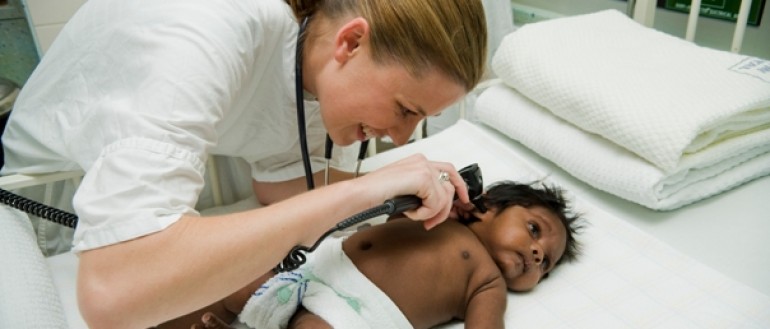My story: Gabrielle McCallum, nurse and PhD candidate
Meet our winner of the 2012 NT Nursing and Midwifery Excellence Award for ‘Education, Research and Innovation’.
A young nurse wandered into the Royal Darwin Hospital tearoom and looked quizzically at a job advertisement pinned to the notice board.
The ad, posted by ear health expert Dr Peter Morris, asked for a researcher. ‘I’m not qualified’ she said to herself. But the idea had looped its way into her thoughts.
“I knew deep down that I wouldn’t remain a hospital nurse. I wanted to make a difference to families in a less traditional way',” she says of the move that saw her zigzag from the hospital to Menzies and chart a second chapter of her working life.
Gabrielle McCallum first came to the Northern Territory as a nursing student in her final year of study. Seconded to Katherine in the region’s north, she was instantly taken with the children she encountered.
“I fell in love with the Aboriginal kids. There was something really special about them. So when I graduated, I took the opportunity to leave Adelaide and come back to the Territory – but this time to Alice Springs.”
Though she started in the bustling, chaotic emergency room of the Alice Springs hospital, McCallum soon moved to the paediatric ward. A year later, she headed north to gain further paediatric experience in Darwin.
Once enticed to explore work beyond the ward, she’d spend the next 11 years dividing her time between Menzies and short stints at the hospital.
Her first research role saw her involved with a 2001 cross-sectional study examining the impact of the newly-introduced Prevenar pneumococcal vaccine on ear disease.
“There wasn’t a huge amount of research taking place in the Territory then, so we were paving the way for remote work,” she says.
“Our project went to 29 remote Indigenous communities, many of which hadn’t had researchers visit before. We made some mistakes – but we also made inroads.”
Fast forward to 2012, and McCallum’s role now includes far more of the educational work that she cherishes.
“The research component is integral to my job; however supporting families and health staff through education is of equal importance.”
McCallum coordinates a range of respiratory projects within the Child Health division.
Her team conducts clinical work, and creates culturally-appropriate resources to teach health clinic staff, nurses and families about common lung diseases, such as bronchiolitis, pneumonia and bronchiectasis.
After receiving a recent grant from the Australian Respiratory Council, McCallum and staff developed a range of talking posters and flipcharts which were produced in English and 11 local languages.
These resources teach good hygiene, warn of the dangers of smoking, and provide advice about the treatment and prevention of cough.
“Coughing is a big issue in the bush because it has become ‘normalised’,” says McCallum. “When the vast majority of people in a community are coughing, people don’t see it as a problem. Addressing that misconception is a big focus.”
McCallum adds that raising awareness about ear and lung health among families and communities has brought happiness to her working life.
What drives her is a desire to see change in the way we manage young children with respiratory disease. So much so that she’s turning the topic into a PhD thesis – one she plans on finishing two years from now.
Her study will examine the management of Indigenous children with acute bronchiolitis.
“When these children go from the community to the hospital and back to the community, they often get lost. We need a system that supports a more comprehensive follow-up. This will reduce the impact of ongoing respiratory symptoms and further disease.”
McCallum remains pleased at her tearoom epiphany, now more than a decade behind her. “Making the transition from nurse to researcher is one of my proudest achievements. I love what I do.”

